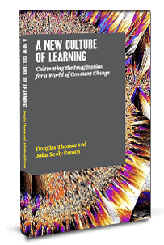John Seely Brown, co-author of A New Culture of Learning (Jan. 2011), says that in the digital world, knowledge is in a constant state of change and that it not only requires constant learning, but a new kind of critical reasoning. How we experience knowledge is different and a new way of thinking is emerging to process it.
For example, in basic information seeking, we read Wikipedia differently than we read the Encyclopedia Britannica. We can read the editing history of Wikipedia articles to see the kind of scholarship that contributes to our knowledge. In the EB, we get the final conclusion of the author in the article on Pluto, but we don't get to witness the back and forth debate by scientists and philosophers about whether or not Pluto should be categorize as a planet.
Brown says that in the new culture knowledge acquisition involves tinkering and participation. It requires pushing buttons rather than reading the manual. His most eye opening statement, is that this kind of learning cannot be taught but it is a disposition that can be cultivated. Students must come to the learning community with a sense of curiosity, questioning, and connecting or engaging. If they don't have it, they won't get it. Learning is not passive. Students must see it as a riddle that is fun to solve.He says that librarians play a big part in this shift because of our mission to teach information literacy. This is an exciting challenge that I both welcome and fear. I welcome it because I want to make a difference and I feel that I am uniquely positioned to do that. In fact, I have lately become more convinced that my life before becoming a librarian will come more to bear on my role in this. My education, skills, and experience in social work, teaching, and instructional technology inform my application of information science. That, along with my desire and personal mission to help people should prepare me adequately for the task.
But I fear we may not be able to adequately prepare our students for this new kind of learning. The Library has been dealing with the fact that what constitutes information literacy has been a moving target for some time now. The problem now, according to Brown, is that both the target and the learner have actually morphed into something new. Not only is information changing, but knowledge – making sense of it – is different.
How can we encourage a sense of curiosity, questioning, and connecting? And, with respect to assessment and accountability to educational goals and learning outcomes, how will we know if we are successful? How does one measure and cultivate a disposition?
The task before us is clearly bigger than librarians helping students find stuff easier. It includes aligning library resources and services to facilitate networks of learning communities. This requires us to work together with students, instructors, and student services to support the curriculum in ways that are meaningful to students.
Are you curious?


No comments:
Post a Comment